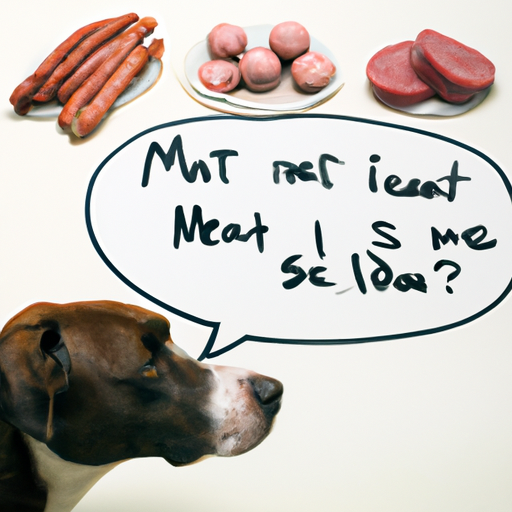As a responsible pet parent, you want to provide the best possible care for your beloved furry friend. This includes ensuring they get the right nutrition, of course. Many people know that certain foods are off-limits for dogs, such as chocolate and grapes. But did you know that some meats can also be harmful to your pet? This comprehensive guide will delve into what meats dogs should avoid, and why.
Table of Contents
- Understanding Canine Nutrition
- Meats That Dogs Should Avoid
- The Risks and Benefits of Feeding Your Dog Meat
- Safe Meat Options for Dogs
- Managing Your Dog’s Diet
- Frequently Asked Questions
Key Takeaways
- Not all meats are safe for dogs to consume.
- Some meats can pose significant health risks to your pet.
- There are safe and healthy meat options available for dogs.
- Proper diet management is crucial for your dog’s wellbeing.
Understanding Canine Nutrition
Dogs are primarily carnivores, but they’ve evolved to be omnivores in practice. This means they can eat a variety of foods, not just meat. However, protein from meat remains a vital part of their diet. But not all meats are created equal – some can pose serious health risks to your beloved pet. As a responsible pet owner, it’s important to know which meats are safe and which should be avoided.
Meats That Dogs Should Avoid
Here’s a list of meats that you should never feed your dog:
- Raw Pork and Ham: These can carry a risk of trichinosis, a parasite that can cause sickness in dogs. Cooked pork is safe in small quantities.
- Raw or Undercooked Poultry: Raw chicken or turkey can contain harmful bacteria, such as Salmonella or Campylobacter.
- Highly Processed Meats: Sausages, hot dogs, and luncheon meats often contain high levels of salt and preservatives, which can be harmful to dogs.
- Fatty Cuts of Meat: Too much fat can lead to pancreatitis in dogs. This includes fatty cuts of beef, pork, and lamb.
- Bones: While not technically meat, bones can cause choking or serious injury to your dog’s digestive tract.
The Risks and Benefits of Feeding Your Dog Meat
Feeding your dog meat has its benefits, such as providing essential proteins and nutrients they need for a healthy life. However, it’s crucial to understand the risks associated with feeding your dog the wrong type of meat or improperly cooked meat. Salmonella, E. coli, and other bacteria present in raw or undercooked meat can cause serious illness in dogs, just as in humans.
It’s also important to remember that dogs don’t process fat as efficiently as humans do. Therefore, feeding your dog fatty cuts of meat can lead to pancreatitis, an often painful and potentially serious condition. OneTopDog has a detailed guide on dog nutrition that you may find helpful.
Safe Meat Options for Dogs
While there are meats to avoid, many are safe and healthy for your dog. These include lean, cooked meats like chicken, turkey, fish, and lean cuts of beef. Always ensure the meat is properly cooked and cooled before serving it to your dog, as this helps eliminate any potential bacteria.
Fish, especially oily fish like salmon and mackerel, are excellent sources of omega-3 fatty acids, which are beneficial for your dog’s skin, coat, and brain health. Remember to remove any bones before feeding fish to your dog.
Managing Your Dog’s Diet
Managing your dog’s diet can be a challenging task, particularly if you’re a new pet parent. Understanding the right balance of nutrients your dog needs is crucial for their health and wellbeing. You should also be mindful of their calorie intake to prevent obesity, a common problem in dogs.
When it comes to meat, moderation is key. While meat should form a significant part of your dog’s diet, it shouldn’t be the only thing they eat. OneTopDog provides useful information on the best dog foods for a balanced diet.
Frequently Asked Questions
1. Can dogs eat raw meat?
While some pet owners feed their dogs a raw diet, it’s generally safer to feed them cooked meat to avoid the risk of bacterial infections.
2. Can dogs eat bones?
While dogs naturally love to chew on bones, they can pose a choking hazard and can splinter, causing injuries to the mouth, throat, or digestive tract.
3. Is it okay to feed my dog meat every day?
Yes, but it should be part of a balanced diet that includes other nutrients. Avoid fatty cuts and highly processed meats.
In summary, it’s important to be informed and cautious when it comes to feeding your dog meat. Not all meats are safe, and some can pose significant health risks. Always aim for lean, cooked meats and avoid feeding your dog raw or undercooked meat, highly processed meats, and fatty cuts. With careful management and the right choices, you can ensure your dog enjoys a balanced, nutritious diet that supports their health and wellbeing. For more information on dog care and nutrition, visit OneTopDog.



